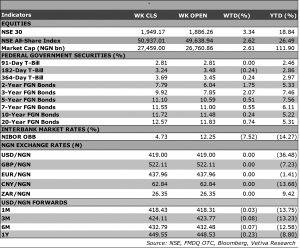| What will shape markets in the coming week? Equity market: The Bulls continue to dominate the market, amid strong Q1 financial performances and positive investor sentiment. We expect the green closes to persist in next week’s session, although we do anticipate some profit-taking on this week’s strong performers. Fixed Income: In the absence of market catalysts in the coming week, we expect current sentiment to persist in the bonds space, while anticipating muted activity in the NTB segment ahead of the PMA. Currency: We expect the naira to remain largely stable across the various windows of the currency space as the CBN maintains interventions in the FX market. MTN NIGERIA PLC Q1'22 Earnings Release Data business to boost FY’22 earnings MTNN reported a solid performance in Q1’22, with revenue and profitability margins all witnessing expansion. The company’s revenue came in 22% higher y/y at ₦471 billion (Vetiva estimate: ₦464 billion), and revenue growth was primarily driven by expansion in its data business. Revenue from this service line grew 54% y/y, underpinned by increased area coverage that has driven the usage of MTNN’s network as a primary data provider. For more colour, MTNN has continued to enhance its network coverage and due to service quality and availability, the company has seen a rise in data demand and active data subscribers. The company recorded a 10% y/y increase in active data subscribers and also witnessed net add-ins in data subscribers q/q. Also, despite a y/y decline in mobile subscriber base, voice services still posted a 6% growth to come in at ₦218 billion. The company’s mobile subscriber base is still dealing with the aftermath of the NCC’s NIN-SIM linkage policy; however, subscriber base returned to net-positive additions in Q4 and has maintained an upward trajectory since then. Thus, a growth driver for the company’s voice business was the fact that they recorded higher usage from their active SIM base, helping to offset the impact of the NIN-SIM restrictions. Margin-wise, EBITDA margin further improved to 55% y/y (Q1’21: 53% Q4’21: 54%), as a faster growth in topline and the company’s cost-saving drive helped accelerate margin expansion. Consequently, EBITDA advanced 26% y/y to ₦257 billion, while PBT came in at ₦143 billion (up 39% y/y) and net profit for the year increased 31% y/y to ₦96 billion. Moving away from the income statement, the company’s cash position remained solid, with cash generated from operations up 64% y/y to ₦227 billion. However, given the company’s higher capex spend during the period, net cash position was down 40% y/y. For subsequent quarters, we believe the company will continue to expand its 4G coverage, thus we project a 33% y/y growth for its data business. The company’s voice service is however expected to record marginal growth of 5% y/y as the NCC’s directive to bar outgoing calls in respect to the SIM-NIN policy and the growing preference for internet calls is likely to affect growth. Overall, we see 2022 revenue coming in at ₦1.9 trillion (up 18% y/y). Meanwhile, given the likely payment of $275 million for the recently acquired 5G license, we believe that this may drag bottom line and expect PAT to come in slightly lower y/y at ₦293 billion. Other than this, normalized PAT would have come in 27% higher y/y. Overall, we estimate a target price of ₦261.99 per share and rate MTN a BUY. |
MTN NIGERIA PLC Q1’22 Earnings Release – Data business to boost FY’22 earnings


